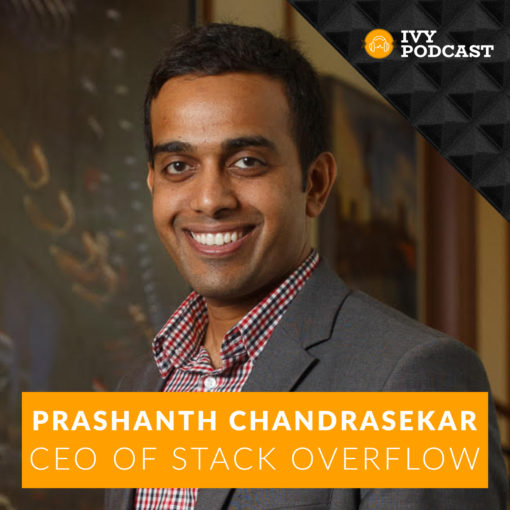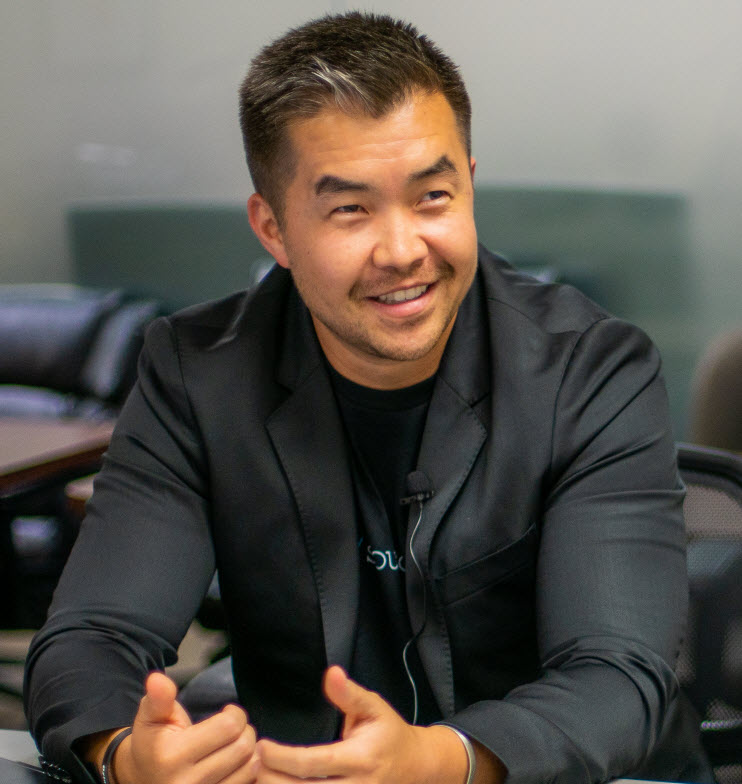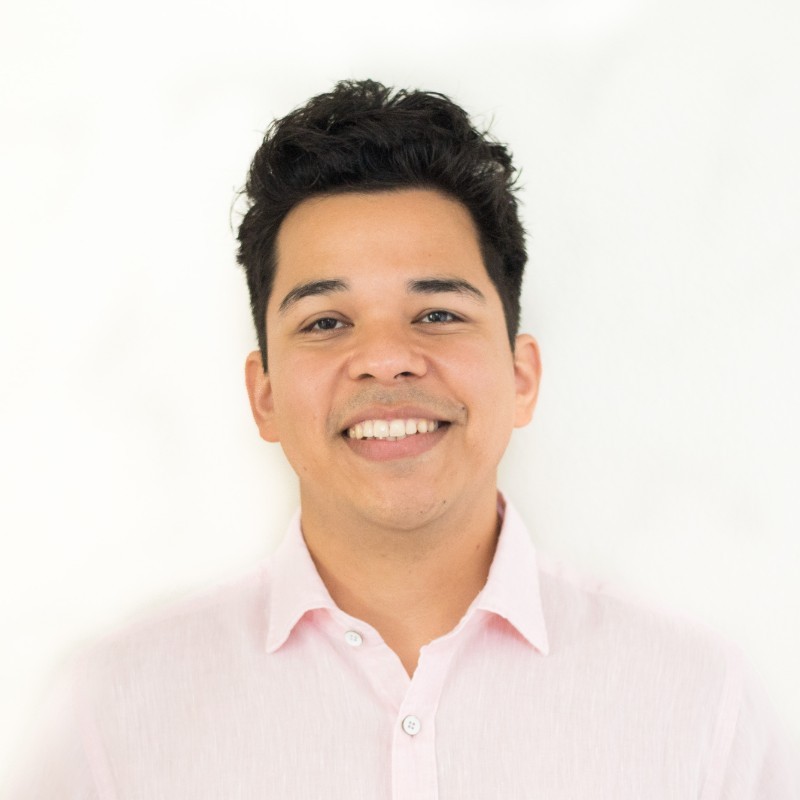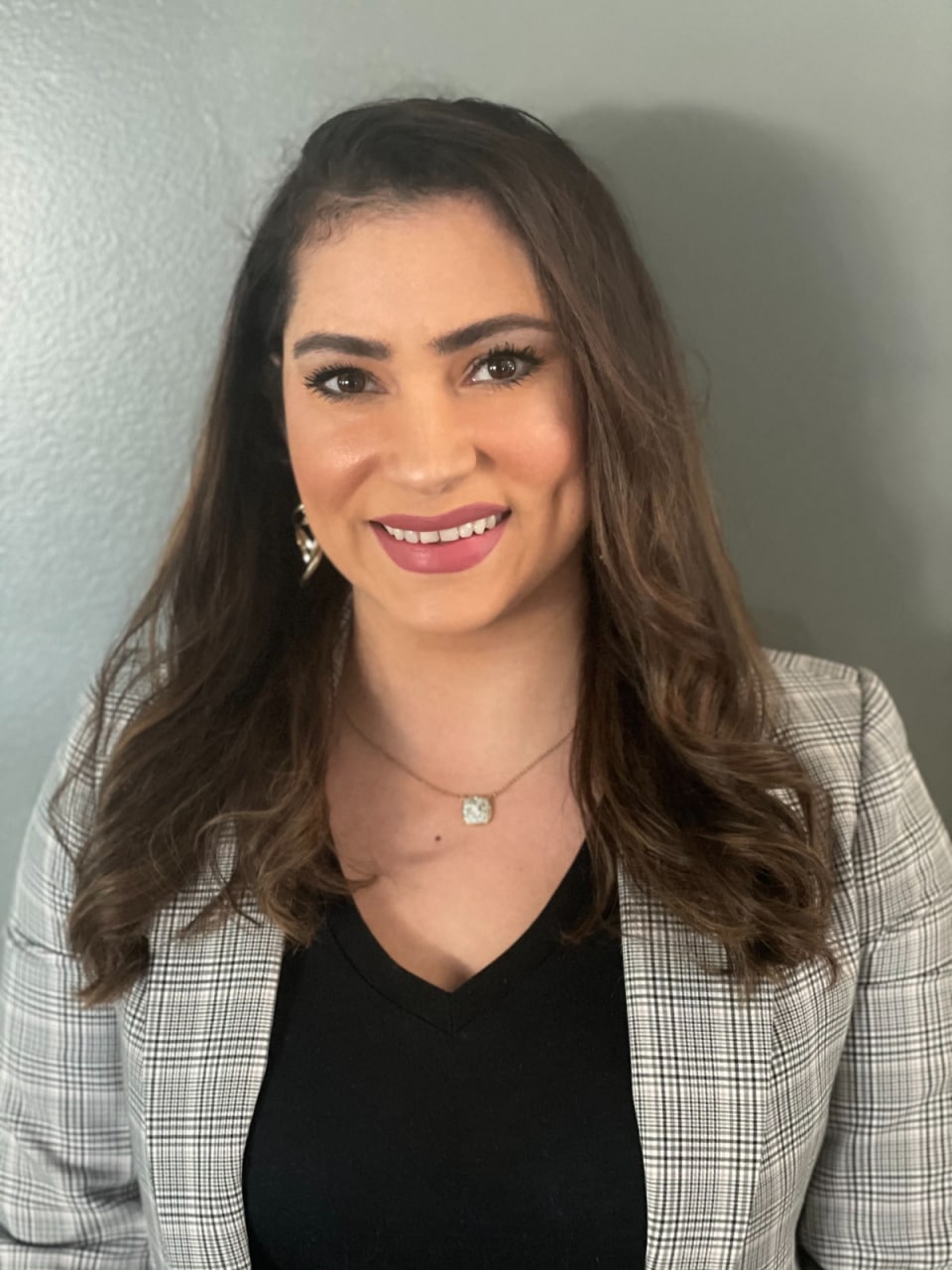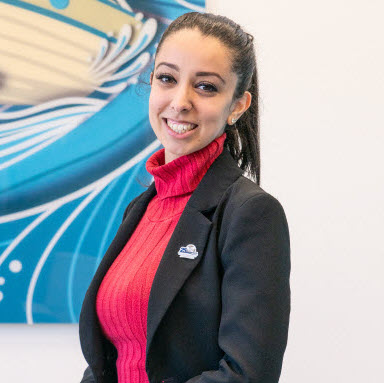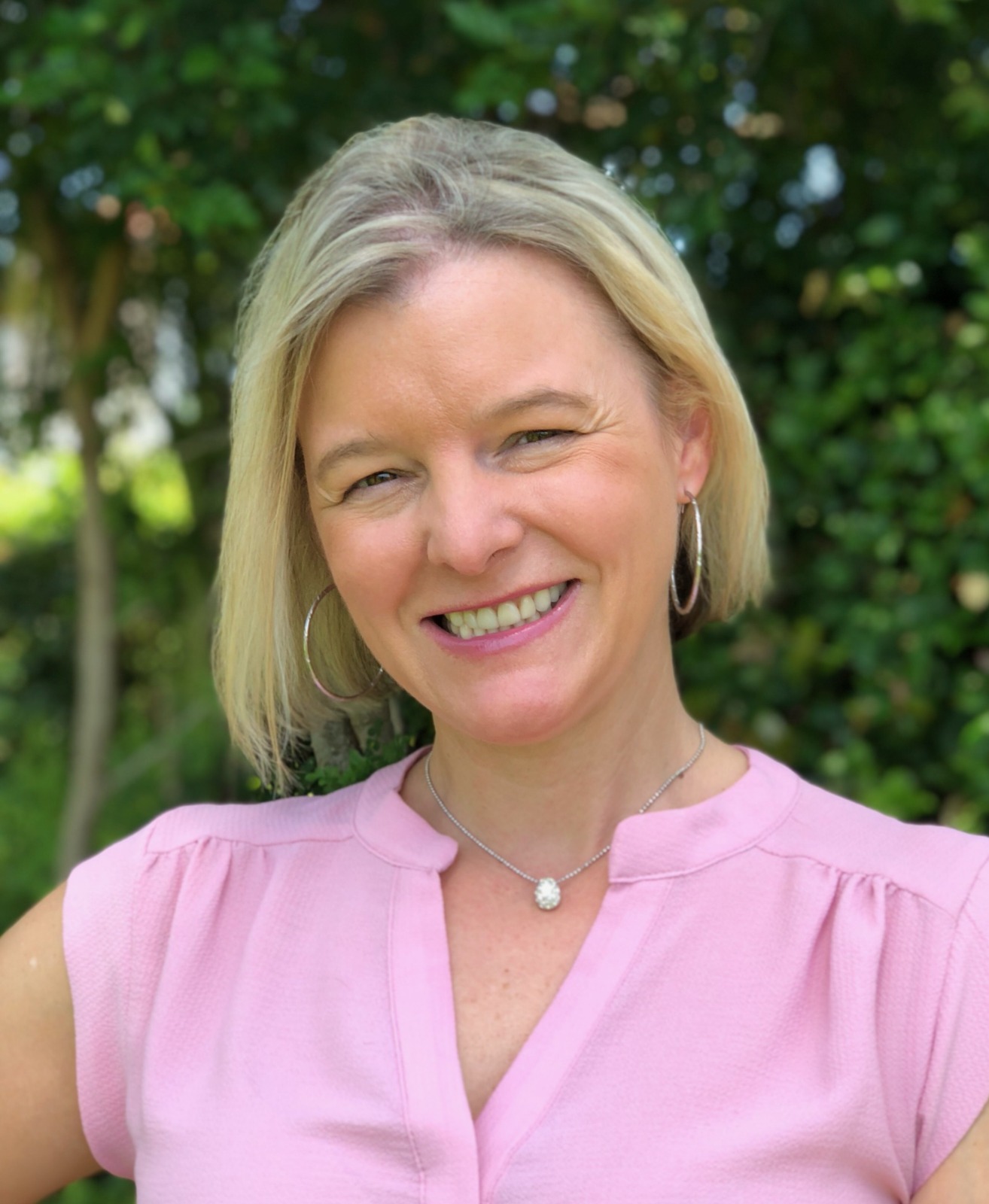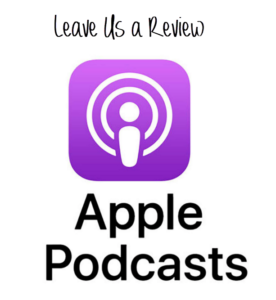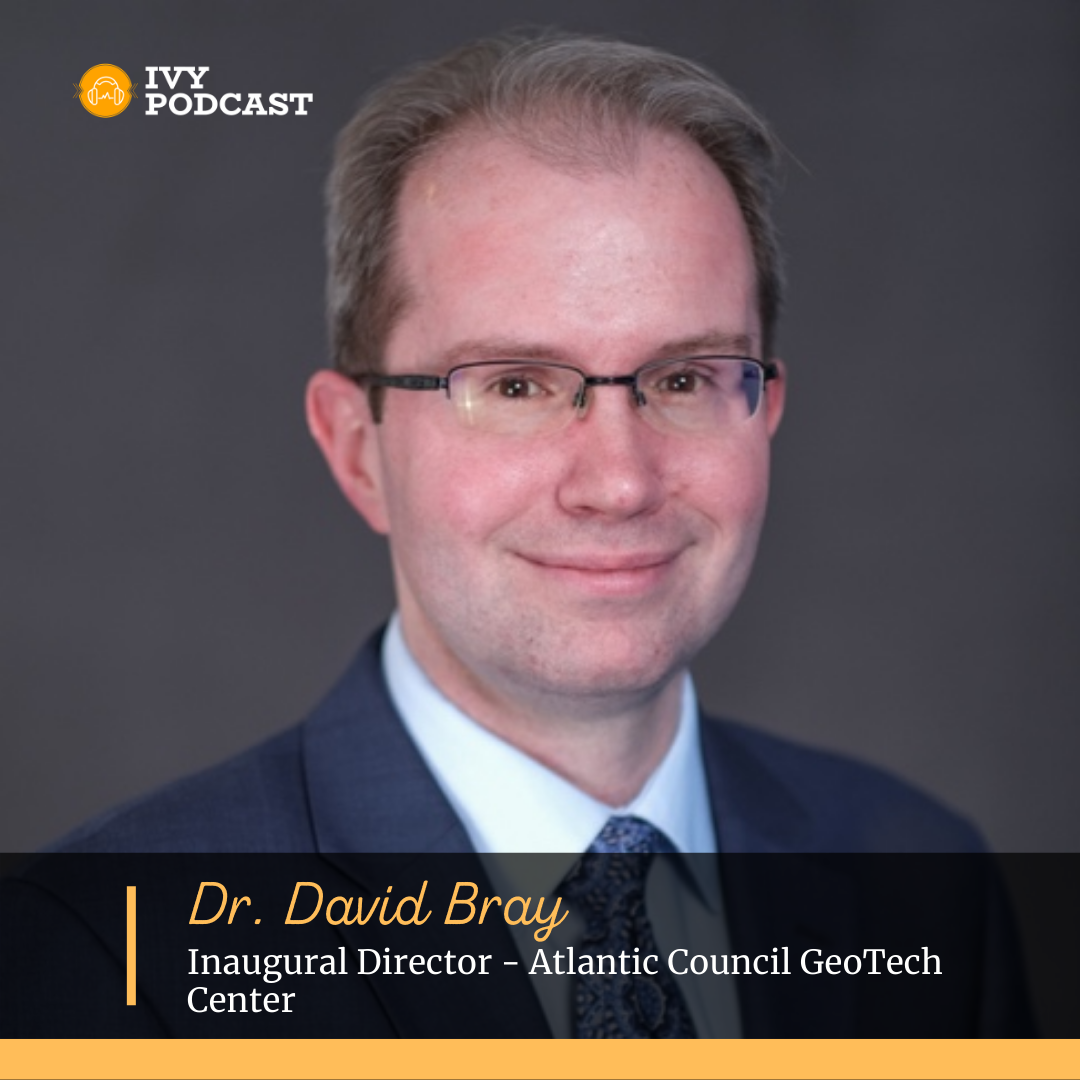
Dr. David A. Bray has served in a variety of leadership roles in turbulent environments, including bioterrorism preparedness and response from 2000-2005, time on the ground in Afghanistan in 2009, serving as the non-partisan Executive Director for a bipartisan National Commission on R&D, and providing leadership as a non-partisan federal agency Senior Executive. He accepted a leadership role in December 2019 to incubate a new global Center with the Atlantic Council.
He also provides strategy to both Boards and start-ups espousing human-centric principles to technology-enabled decision making in complex environments. He was also named a Senior Fellow with the Institute for Human-Machine Cognition in starting in 2018. Business Insider named him one of the top “24 Americans Who Are Changing the World” under 40 and he was named a Young Global Leader by the World Economic Forum for 2016-2021. From 2017 to the start of 2020, David served as Executive Director for the People-Centered Internet coalition Chaired by Internet co-originator Vint Cerf, focused on providing support and expertise for community-focused projects that measurably improve people’s lives using the internet.
He also was named a Marshall Memorial Fellow and traveled to Europe in 2018 to discuss Trans-Atlantic issues of common concern including exponential technologies and the global future ahead. Later in 2018, he was invited to work with the U.S. Navy and Marines on improving organizational adaptability and to work with U.S. Special Operation Command’s J5 Directorate on the challenges of countering misinformation and disinformation online. He has received both the Joint Civilian Service Commendation Award and the National Intelligence Exceptional Achievement Medal.
Episode transcription:
D: Hello. I'm Dr. David Bray, a director at the Atlantic Council GeoTech Center. Thanks so much for finding time, join us on the podcast today to excited to host you here at the beginning of 2021. I’m looking forward to just like everybody else put the 20 behind us and focus on kind of the new period. J: So that's exciting to have you here. Can you tell us a little bit more about your background, where you come from career wise and a little bit more about your current role? D: Sure. The short version of my background is that I fell in my head at an early age and that made all the difference, but the slightly longer version would probably be my background. It's kind of eclectic. I was fortunate enough that I was good with computers at an early age. So good that actually led to the government offering me a job when I was 15. I actually had to get a work permit because I was technically, younger than the legal age to work in the state that I lived in. That led to me working initially first at a physics facility. This was back in 1993, where they were modeling electrical. They were actually using electron beams or trying to understand subatomic particles, neutrinos and quirks. And so I got involved with trying to model. What would happen with the electron beam and what might be done with the electron beam, if different physics experiments were done fast forward, later when I was 17, got called down to the principal's office, everyone's like. And it was really four individuals offering me a job at a place called the Institute for Defense Analyses (IDA). It would involve classified work involving satellites tied to at the time what was called the Ballistic Missile Defense Organization. And finding civilian purposes. And so one project, I got to be a part of picked up crop growth from space, tried to predict famines in advance and try to be ahead of the curve to try and help people there. But then another thing that I actually got to lead was demonstrating a prototype of could we pick up forest fires from space and try and model the wind conditions or foliage conditions and try and guess where things were going to go. So that was kind of not a normal beginning to things. Also in parallel during all this as well. I got an invitation to work with the US Navy with Dr. Robert Ballard, who was the discoverer of the Titanic. And basically this was in the Sea of Cortés. We were mapping the hydrothermal vents. We were trying to understand the plate tectonics and the region, and I was doing a computer model of that as well. So not a normal beginning briefly spent time with both Microsoft and later Yahoo, or actually, sorry, other way around Yahoo. And then later Microsoft, trying to actually understand, one what could be done with Fortune 500 companies. Again, with this idea that technology can actually have a positive impact in the world. And that led to me showing up in South Africa where I actually built computer models of the spread of HIV/AIDS, because the interesting thing they had gone from 5000 cases in 1994 to 2.4 million, just four years later in 1998. And so I was not just trying to build a model, but it was underground trying to advocate that they actually needed to do some more proactive policies on HIV/AIDS. It was interesting though, because I kind of kept on hitting some walls and I ended up teaching in the schools instead because it was that seemed to be the best way to do advocacy about trying to do some prevention on HIV/AIDS. So that led me to working for the centers for disease control where I joined in 2000 a little known program called the bioterrorism preparedness response program. We were only 30 people, and every six months or so old, we were told we didn't need to exist. We were Cold War relics, and it was actually scheduled weeks in advance for me to give a briefing to the CIA and the FBI, as to what we would do technology-wise should a really bad day happen. That briefing just happened to be scheduled for September 11th, 2001 at nine o'clock in the morning, which unfortunately, as we all know, tragedy hit at 8:34, the world changed. We literally piled computers in the cars and that with response to 9/11 stood down from high alert on October 1st, a brief stay on October 3rd only to have the first case of anthrax show up 24 hours later. So it was a very busy time. I'll fast forward from there just saying what's now virus happened severe acute respiratory syndrome happened. Monkeypox happened. A lot of other things happened, went and got a PhD, after dealing with some of those responses, focusing on how to improve organizational response to disruption using both technology and data. It was interesting at the time schools of engineering said, we like your proposal, but we don't understand the people part and schools of policy said that we like your proposal if we don't understand the technology part. So it was actually in a business school. And then literally after I graduated, did postdocs at MIT, Harvard, and then went to raise my hand to go to Afghanistan. And you might say, well, why Afghanistan? Well, that seemed to be an interesting challenge of how do you work humanitarian efforts? Have you worked with military efforts there to stabilize the region? How do you coordinate across all those? And so it was in some respects to put in place my dissertation proposal which at the time, what I wrote about was how do you empower the edge? How do you actually? Do a team approach, which of course later, of course we know others have also been echoing that as well, which is great. Came back and continued to ghost write papers for about a year and a half on different issues involving technology and the future of work, but also cybersecurity. I remember writing a paper in 2009, 2010 on how we need a way to do cyber deterrence because things were only gonna get harder and harder as cyber intrusion technology has got democratized. Then became a senior National Intelligence Service executive, initially doing information sharing to try and prevent terrorism events, but also at the same time, protect privacy and civil liberties. That was a non political position and was quite interesting. More than that later on folks, aren't just saying that, but it was an interesting challenge that I tried to stand for what I could as best I could and then got approached to actually join. You serve as the executive director for a Bipartisan Commission that had six democrats, six republicans reviewing the R and D efforts of the entire United States Intelligence Community. that was interesting because when I was recruited for that role, they did not tell me there had been three executives in about three months not working out. And I was now number four and so they always tell you, no, they don't tell you what came before you. And the good news is a year and a half later, we were like based for classified reports, one unclassified report with Bipartisan praise and then thought it would be easier to go from having 12 commissioners to five commissioners at the federal communications commission where I parachuted in 2013 into a role as their chief information officer. That was an interesting case where they'd had I think they had had eight or nine different acting in different CEO's and different roles over a period of nine years. And so it was always a good sign when you parachute in that things must be going great. And what I found is I listened to people and tried to understand the lay of the land is that they had more than 207 different IT systems. They were spending more than 85% of their IT budget just to maintain those systems, not even do improvements or anything like that, just to maintain them. And that was obviously a death spiral. And so through the efforts of the entire team, and I really do want to give efforts to the entire team and empower the edge. And two and a half years, we turned that around from having things on premise to nothing on premise. We either moved to private hosting or public cloud. And as a net net result got that spend down from 85% to 35%. Essentially what was a fixed budget which was game-changing because then we can actually use that to do new development for the people in the public who did that for about four years. So I had good news: I survived much longer than my predecessors and then joined Vint Cerf with an offer at the people-centered internet coalition, which was back in 2017. Was concerned that the internet was increasingly becoming polarized. There were concerns about misinformation disinformation, and that this was not something that was bringing communities together. And that was a nonprofit, I was the executive director behind the scenes. So also had some opportunities to work with special operations command on the increasing challenges of misinformation, disinformation, and did that for about three years before we finally lead to where I am now at the Atlanta Council GeoTech Center, where I got approached to help create an and start a new center focusing precisely on how is how our data and technology efforts, changing geopolitics, changing how the world operates and then vice versa. How is the world being changed by these technologies? And so if anything, I look at my career, it's been exactly that, which is trying to understand how new technologies change the world. J: What a background! And congratulations on all the great successes. D: Oh, I wonder if some of it looks like success. Some of it was doing the best I could. Some of it was some dead ends. J: I did history, definitely very diverse backgrounds. You've talked from cyber security to government affairs to climate change. So, it's great. It's super exciting. So, definitely a great place to host you here. So from taking that context and to where we interviewed a lot of executives, a lot of startup founders, very entrepreneurial myself and can't help, but ask you. In terms of the current trends or the different ideas that really excite you these days. What are you from your standpoint? What are you currently researching? What do you think is the next big thing in the next period, share with us any of your thoughts and your ideas? D: Right. So I think we're in a period of some might say period of inflections. I may say a period of transition where things are changing and it is unclear yet what will take its place, but it is clear. The way that we operated post-World war two, which was the idea that there were strong governments that were more top-down in nature that even in corporations, it was like organized by hierarchy. That was the effective way to operate in an era in which quite frankly, information was somewhat scarce communication was laggy. It took time to do coordination and coordination. And so you organized for that? Well, that's no longer the case. I mean, we are now facing a world where there's anywhere between 35 to 45 billion network devices on the planet. Relative to 7.7 billion human beings. So we humans are the minority on the planet. Relative to network devices same thing with, in terms of the amount of activity on the Internet. People don't realize that it was around 2012, 2013, that the Internet traffic more than I think it was at the time about 59% of internet traffic at that point tipped over to being bought driven versus human driven. So we're also the minority on the Internet as well. The amount of data on the planet right now the estimates are in about two or so years, two and a half years, there will be 120 petabytes. That's 120 billion terabytes of data on the planet, which some say is three times all the conversations we've had as a species. So, whatever this new world is, this geo-tech decade in which information and data and technology are really surrounding us are raising interesting questions about how do we organize? What is the future of work? What is the future of communities? How do we make sure it doesn't become surveillance state or surveillance capitalism for that matter? Because short of an EMP blast or something even worse that takes out all these devices and takes out all these data, they will be there. How do we avoid the temptation for that to become surveillance? And instead, try to figure out ways that are people affirming and community affirming. And at the same time, be aware of the information environment. I mean, if you look at just the events of 2020 and the start of 2021, the information you receive will shape your perceptions of reality and will shape your sense-making. And if we're not careful, we'll create information environments that are more divisive and polarizing versus unifying for people. J: Yeah, absolutely. And it's a unique time. We're all in with a pandemic seeming to be behind us yet, it's still very prevalent. And a lot of the things that really happen through the first part of 2021 seems like definitely interesting times. So, it can definitely resonate with a lot of ideas that you're talking about, but back to kind of the period that during the war. You know the role, well, the more one period, almost recovery, recovery period. So that's, definitely very exciting. You talk and you post around the future of work or future of governance, in the future of mantic communities, see you're very vocal about this. I'm pretty sure you do a lot of research on that particular con and those concepts. D: Yeah. J: Tell us a little bit more about this. What are the thoughts behind these theories and what's the premise behind them? D: Sure. So with the GeoTech Center and the work that we do, it really is grounded on the premise that we are in. We are entering the geo-tech decade and that's again, how technology changes geopolitics, where capabilities and the reach of technologies are providing individuals and communities. The ability to do things that 30 or 40 years ago were only possible by the large national security apparatuses of say the United States and Soviet union. At the time that day as an individual, you, as a company can do things right. We're only possible by the CIA and the KGB 30 or 40 years ago. And so this is why I always tell people the good news is technology is getting democratized. Oh, the challenging news is technology is being democratized. And so people ask like, why are we seeing an increase in misinformation? Disinformation would be like, well, quite frankly, in the 1980s, 1970s, I mean, the intelligence communities were aware of misinformation. Disinformation was being done. We know now the Russians finally came out in the 1990s that they were very active in trying to propagate misinformation that HIV/AIDS had been created by the US government to serve as a weapon against its own people. That was obviously not true, but at the time there were people that believed in and there were active efforts to try and spread that well, those same capabilities are now democratized that anybody can do it. And so I say the great news about the internet. Anyone can print whatever they want. The challenging news about the internet, anyone can print. And so, we're living in a world in which technology is being tied to democracy. This is giving new capabilities to some individuals, but now we have to recognize too. It's not giving everybody the same capabilities justly or evenly. And so we need to think about what we can do to help people have more access to these technologies and capabilities, more opportunities, and even the education, the military necessary to use them, because if we don't empower everyone equally, then that sets the seeds for something that I think would be really bad. Either an Opera sees neo-feudalism or something like that. And so we have this obligation to try and lift up everybody. So they're empowered. And then ideally think about how can governance and I'm going to use the word governance and not government, because it may not be the government that does this, but how can community governance or companies play a role or even just individuals encourage governance that steers more towards using these capabilities for good, which of course requires us to actually say what does good look like in the next decade involving technology? I mean, if you go to say China, they may say, it's about making sure there's stability and that there is security and that things are under control. Well, okay. But that also may mean that you are now acquiescing to surveillance and having everything monitored here in the United States. I don't think we'd have that same answer. But then the question is, what does good look like for the United States in terms of using these technologies and data to empower you to have choice about what's done with your data? Well, what does that look like? How does it actually play itself out? Do you have a digital assistant? For Europe, of course we know they've planted the flag and said, GDPR, General Data Protection Regulation. It's ever a European individual goes, you must treat them as if they're in Europe, even if they're not in Europe, which is kind of interesting because I'm waiting for the train wreck to occur where Europe says GDPR give people privacy, even if they're in your country and China is saying, well, wait, our rule is all your data belongs to us because it's for our stability and security. That seems to be an interesting contrast between what Europe is saying in China. So what if someone's in China? Which one do you apply to? And so this is obviously going to raise up to geopolitics. We know also, I mean, just imagine the future of conflict. I mean, I hate to say it, but the next heated conflict will be flooded with images that are both real and not real about what's happening. How do you sift through that? How do you make sense of what's going on? And so as always, I'm trying to go to where the puck is going, not where the puck is and trying to. I always tell people, be bold, be brave and be benevolent. How can we make sure these are uplifting of people as opposed to the alternative? J: Right, right. Absolutely. And no, it can definitely resonate with a lot of these concepts in terms of where we at as a society and the workforce, in the future, all of that, from the standpoint of warfare governance, the communities and the correlation between that and the technology. I think those are very unique concepts. And also, furthermore, when we talk about the kind of these transformation initiatives, whether that's digital transformation, people transformation or whatnot, a lot of organizations are going through that concept of change agents and how's that helping with really succeeding something with someone who's transformation initiatives, share with us a little bit more about that. What's the best practice or what are some of the recommendations for other executives who may be listening right now in terms of utilizing that particular concept and implementing when going through some of the initiatives at their organizations. D: Yeah. So the idea of change agents are leaders who are willing to eliminate the way for whatever positive change that they see. And that positive change has to be something beyond themselves. It has to be something that's for others as well. And there's a couple of concepts unpack that first is the idea of leadership. I often say we confuse leadership with management when we do we meet expectations, we do what someone expects of us. And to some degree, we all have to do that to some degree, if I don't meet the expectations of my boss, I'm probably going to get fired. If I don't meet the expectations of my peers or my reports, or if I'm in a пovernment sending, if I don't meet the expectations of the Congress or the administration, I may find myself exiting. And again, there may be times when the best thing a leader can do is to exit, but you have to be aware of, you have to manage to some degree leadership. On the other hand, though, is when you step outside of expectations and it's the opposite of some respects of management, because now you are going outside of whatever expectations, either your boss or your peers or your reports have. And I often try to point out that there's some say that the word leadership comes from a Greek word leak, which means to be sent unto death because back in ancient Greece, the leaves were the ones that carried the flag in front of the army. And that's all well and good until one army meets another army. And that happens to be the leader because the flag bearers, the ones that are carrying the army are the ones that are killed first. And again, it's not saying that you're always going to get killed if you're a leader physically, I hope not, but that when you step outside of expectations, that's all well and good until you hit conflict until you hit friction. Nelson Mandela said his most frying moment as a leader actually was when he had to turn to his own party, the African National Congress this was during the period of apartheid ending, which is a good, it ended which it should have ended, but he was trying to convince him to do it peacefully as opposed to have a violent coup they wanted a violent case. And he said, no, no, that will only end in more bloodshed. And so it was fortunately he succeeded, but that was hard. And so I would say if you're a positive change agent, you need to be aware that someone is going to want you to get back in your box. You're going to have friction and that the art of a good positive change agent is having a strategy for managing the friction, which gets to the second part, which is positive change agents have to step up to what I call the balcony. When you're in the midst of something, you're going to see a lot of things that are hitting you and you're going to be like, well, why is that person doing that? That makes no sense. Why are they doing it? I don't understand. They're crazy or whatever it might be. And you'll get caught up in the visceralness of the immediate events that are happening. What you really need to do is somehow mentally take yourself to a balcony, to look down at the dance floor and say, why is this other person thinking this way? Why is this other person that I don't agree with acting this way? Because if you can try and figure out an empathize, even if you don't again, it's not condoning, if it's something you're doing something that's important, it doesn't mean you change your mind about what you believe, but at least if you can understand why they're behaving that way, then you can actually figure out a better strategy. And that's, I think so, key because I see a lot of people that want to bring about change, but they never really elevate themselves to figure out what's the strategy. And then come back down to the plant dance floor or whatever world you're operating in to make it happen. And then the last thing I would say is the third thing about being a positive change agent is once you've had that view from the balcony and you've come back. Then you've got to do it as a team sport, that no one person can make the change happen that they want to have happen. It's about building networks. And so I think that is so key because again, I've seen so many people that come in with a desire change. I mean, when I parachuted the FCC, they quite frankly said and I encourage this openness. They said, we're just waiting to see if you're still here six months from now, and fortunately I did, I stayed four years there were challenges and everything like that, but they also were watching when something didn't go right. How did I respond? Cause like the first time something didn't go right. If I started pointing fingers and blaming people that would be game over. But if, instead, I'd say, okay, I'm going to take the hit. I'm going to take responsibility, but I'm also going to ask, how are we going to fix it? Then at least I get some buy-in that says, look, a true leader, serves as a flak jacket for their team. And it figures out that leadership and positive change is a team sport. J: Right. Absolutely. And something that you mentioned as you were, you were talking through this surrounding yourself with the right people whether that's transformation initiative or whatever you going through, I'm curious to get your take on some of the best practices or the strategies that have helped you through your career to find the best talent to not only find, but also retain and develop share with us. Any lessons learned, maybe some areas where you had failed and you had learned something or from a perspective of what really works for you. D: Well, these days to find the best talent retain the best talents and basically succeed, succeed as a group. So whenever I'm like considering either recruiting or working with someone, one of the things I always like to ask them is what brings you joy? Which I know often, sometimes, especially like in a technology background, I'm like, well, why are you asking that? But it's to try and understand, one watch their face, watch them sort of reflect and to actively listen to them as to what excites them, what motivates them because if I can find things that involve getting a mission done that aligned to whatever brings them joy, then they're going to be self-motivated, they're going to tackle that they will not need me to do anything other than ask to say, would you like to take this on? And they'll say, yes, and the reality is there's just so much work that needs to be done often in a crisis management or change situation that you can actually help put people where they need to go. And I think the art of a good leader is okay, how do I take the different teams that I have and actually build something that's stronger than the sum of them, anyone? So I think the first step is to ask people what brings them joy and use that as a way to reflect the second is give people. When you're dealing with someone that maybe you're not quite sure initially about their talents or their gifts or where they really are, give them six weeks to see what they can do. Tell them, I always ask my team. if you have a pitch, I often look at my role as instead of being a leader. That's going to tell you exactly what to do. I'm going to tell you, I'm going to share our vision. I'm going to share our boundary conditions, answer questions, and beyond that, I'm going to be open for you to come and make your pitch for what you think we should do. Almost like an internal venture capitalist. And when you come and make your pitch, give me three reasons why we should do something, three reasons why we shouldn't and then how we're going to mitigate those reasons why we shouldn't. And that shows like that you've done second and told her thinking, and then after that, I'll back your play. I'll give you six months or sorry, six weeks to see what you can do if that works. And I'll give you an additional six weeks and eventually that'll build up to six months and 12 months and go from there. So I think, letting people help set the part chart and giving them autonomy and some sense of being in control and that also motivates them. And then actually people cause oftentimes when I was working in the public sector, we can't always pay you the best, but we set the motivation for you by the mission. And so that was one technique I would do. And two, sometimes you also. There is huge value in working with people that are there that may have, have hit their head against the wall so many times that they are now disenfranchised. So that leads to the last and third thing that I would say is sometimes you're going to find people that seem like they're commercially or they've just shut down, and it's not. And I would encourage people not to write those people off one, listen to them because there may be value in whatever they're congressionally about. But then too trying to figure out what made them come up. And so I can remember once there was a time when I had this meeting with everybody where I said, I can only ask questions for the next hour. I'm just going to listen, but I can only ask questions. And about somebody who said, I have grief, and I said, tell me more. And he said, it happened 17 years ago. I said, tell me more. And he went on to tell me what happened. And of course that was before I arrived and everything like that. And so after listening, I said, I appreciate you sharing that. What do you think we can do to incorporate that as we move forward together and do better as a team. And so it sort of like acknowledged that this person had a grief, they had something that had made them feel like they had beaten their head against the wall and wasn't recognized, but then pivoting and saying, okay, now we go from problem holder ship to problem solving ship. And that it's something that we all do together. And so I say at the end of the day, I think we all have talents. And it's only really a question of is someone going to take enough time as a leader, to both understand them and then give us the opportunity to see what we can do. J: Right. Absolutely makes sense. And last but not least, what are your sources of information and learning? What are you reading? Who do you follow? What do you subscribe to any books that you can recommend to share with us? Your content diet. D: So that's an interesting question because I find that, I mean, again, it goes back to the editor, the amount of data on the planet, it was growing exponentially. I find myself almost having to like be judicious in where I choose to put things. And I am increasingly, it's interesting. I'm going back to old school. I mean, I've done social media and everything like that. I'm just finding that increasingly I need to do intentional listservs because in some respects, the nice thing about a listserv is no algorithm is deciding what I see or not. It's the people on the listserv just posting. And I try to subscribe to different listservs of different things, whether it's about tech or about policy or about what's happening in the world. And I intentionally try to pick groups that are diverse. So if I'm only hearing from peers that I always agree with, and I'm like there's not a lot of value in this. I want to hear people that are going to challenge me that are in a respectful way, but they're either going to have different views internationally or different views tech-wise or different views policy-wise. And so I would say, if you're still on social media, then I would say, make sure you try to ensure that the algorithms are giving you diverse perspectives versus. Who's that meet amplifies your echo chamber. Alternatively, go to email, which doesn't have recommendations by algorithms and actually form a community. One thing I did when I came back from Afghanistan in 2010 was I started a series of virtual meetups. They were about every well, they were actually in-person meetups that became virtual as well. It was a listserv of about once a month. We got together non aggravation, safe space to have conversations. We're doing the same thing now online, even though we can't get together during COVID 19. And it's a non attribution space to have those conversations as well. So I would say. My real guidance for anyone looking for information is look for books. Look for people, look for perspectives. That in my mind, I am learning because I'm having my views challenged on a daily basis. And I think I'm stronger as a result, but you have to be comfortable with that. The other thing I would just say, if you're looking for an interesting read in sort of the future I'm a big believer that good Saifai in this modern philosophy and discussions. And so there's an author by the name of Iain M. Banks. He's written a series called The Culture. One of them is called The Player of Games. That's just one of the several series of books. But to me, it is a modern philosophy of we may be going to in some respects, it paints a somewhat. Revealing anarchistic picture. But goodness still comes out of it and it actually shows how we can find a way to co-exist with technology in a way that is so uplifting of human values. J: I love these recommendations and for our listeners, we'll make those available in the episode notes, Dr. Bray. Thank you enough for your time today. It was a very short and powerful conversation and I learned quite a bit. Looking forward to staying in touch with you. D: Perhaps we could do another episode in near future. See how much I've changed. J: We'd love to dive deeper if you want to on any of the specific topics, and want to thank your listeners. If they do want to find out more about the Atlanta Council Geo-tech Center. We're at GTC. That is G as in George, T as in Tango, C as in Charlie.Atlanticcouncil.org. And boys, please be bold. Please be brave. Please be benevolent for the future ahead. Outstanding happy new year, happy new year.
Welcome to Ivy Podcast! On this Executive Leadership Podcast we interview top executives from Fortune 500 with a focus on strategy, innovation, negotiation and everything about leadership.
Our Podcast for Executives features Thought Leaders who share practical insights for effective leadership, continuous innovation and strategy execution.
Ivy Podcast is a rapidly growing Executive Podcast, which covers topics like Hiring and Retention Strategies, Talent Acquisition, Innovation, Digital Transformation and much more.
On this Leadership Podcast, you will find conversations with the most accomplished executives from Fortune 100 companies. We aim to cover a broad range of industries and create a learning platform for the most ambitious and high potential professionals who are looking to learn from the most accomplished Executives on this Business Leadership Podcast.






